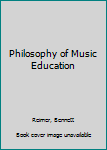Philosophy of Music Education
Select Format
Select Condition 
Book Overview
This book seeks to develop a novel approach to literature beyond the conventional divide between realism/formalism and history/aestheticism. It accomplishes this not only through a radical reassessment of the specificity of literature in distinction from one of its others - namely, philosophy - but above all by taking critical issue with the venerable concept of the text and its association with the artisanal techniques of weaving and interlacing. This conception of the text as an artisanal fabric is, the author holds, the unreflected presupposition of both realist, or historicist, and reflective, or deconstructive, criticism. Gasche argues that the scenes of production within literary works, created by their authors yet independent of those authors' intentions, stage a work's own production in virtual fashion and thus accomplish for those works a certain ideal ontological status that allows for both historical endurance and creative interpretation. In Gasche's construction of these scenes, in which literary works render visible within their own fabric the invisible conditions of their autonomous existence, certain images prevail: the fold, the star, the veil. By showing that these literary images are not simply the opposites of concepts, he not only puts into question the common opposition between literature and philosophy but shows that literary works perform a way of argumentation that, in spite of all its difference from philosophical conceptuality, is on apar with it. The argument progresses through close readings of literary works by Lautramont, Nerval, de l'Isle Adam, Huysman, Flaubert, Artaud, Blanchot, Defoe, and Melville.
Format:Paperback
Language:English
ISBN:0136638724
ISBN13:9780136638728
Release Date:June 1970
Publisher:Prentice Hall
Length:173 Pages
Weight:0.70 lbs.
Customer Reviews
2 ratings
Inspiring
Published by Thriftbooks.com User , 18 years ago
Some of Bennett Reimer's writings are very inspiring. I am so thankful that my college professor used this particular book for our required reading.
A Great Read For All Music Educators
Published by Thriftbooks.com User , 26 years ago
This text presents an excellent philosophy of music education! It makes clear that the nature and value of music must be found WITHIN it, not outside. We music educators must express to the public that music in itself is good and should not be an excuse or tool for increased standardized test scores, etc. Currently, more and more music educators are forced to link musical attributes to scholastic activity. This deteriorates the nature and value of music. Author Reimer makes it clear that an aesthetic view of music education is a goal for all music educators to strive for.





